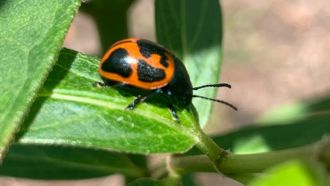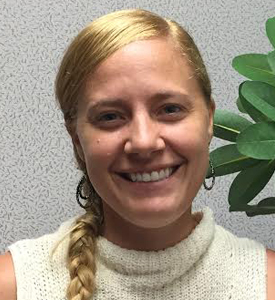
Discover your own backyard at the Oakwood Bioblitz
In her 20 years of studying insects, University of Dayton biology professor Dr. Chelse Prather has observed many species of bugs. Recently, she added a new one to her list: the swamp milkweed leaf beetle. Prather spotted the insect on swamp milkweed in Wright Memorial Public Library’s native garden.
“I was super excited because I'm an insect nerd and it was something that I'd never seen before that I always wanted to see,” she said. “And it made me think, wow, the library put this in partially to promote native biodiversity and it is working: the native species are finding their host species.”
Prather and students studying in her UD lab will be at Wright Library Sept. 9 from 11 a.m. to 3 p.m. to share ways to identify insects and plants as part of a kick off event for the Oakwood BioBlitz. A bioblitz is a community science effort to record as many living species as possible in a designated area. Anyone can participate, but observations must be made within the city of Oakwood on Sept. 9 and 10th.
By participating in a BioBlitz, people of all ages begin to appreciate nature and learn what’s around them, Prather said. The efforts are also used by scientists to expand their knowledge of the environment.
“It allows (scientists) to answer questions about what invasive species are in the area, or ranges of native species increasing or decreasing,” she said. “Are we seeing something new in an area that we've never seen before? There are a lot of scientists using that data that everyday people are collecting.”
“If you build it they will come”
 In 2021, Wright Library and a team of volunteers created two native plant gardens — a sun garden near Telford Avenue and a shade garden on the Aberdeen side of the library – in 2021 to increase biodiversity and create an educational experience for the community.
In 2021, Wright Library and a team of volunteers created two native plant gardens — a sun garden near Telford Avenue and a shade garden on the Aberdeen side of the library – in 2021 to increase biodiversity and create an educational experience for the community.
“When we plant native species like milkweed, we are fostering the entire community of insects and the predators of those insects and the predators of those predators. We're supporting the food webs around us that depend on those native species to survive,” she said “We are fostering biodiversity in our backyards or on our public lands by planting those native species.”
Prather and her students are working with Five Rivers Metro Parks to test the “if you build it, they will come” concept held by many restorationists, who say that if you add native plants, the native species will return.
“We've been trying to scientifically test that, but that is what happens: eventually, everybody else does come when you put in those native plants.”
Learn more about participating in the 2023 Oakwood BioBlitz, including the Saturday kick-off event and two guided hikes to Houk Stream.
Prather shared these tips for finding insects in your yards:
- Plants are a good place to start. Look on different types of vegetation.
- Don’t just look on the tops of leaves: look underneath them, look on their branches and stems, look all around.
- Look on the ground. Flip over rocks. Flip over leaf litter.
“And just by doing that,” she said, “you're probably going to see a lot of stuff that you have never seen before.
